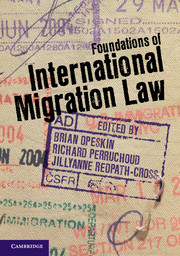Book contents
- Frontmatter
- Summary contents
- Detailed contents
- Preface
- List of case studies
- List of boxes
- List of figures
- List of maps
- List of tables
- Notes on contributors
- Abbreviations
- 1 Conceptualising international migration law
- 2 Contemporary patterns of international migration
- 3 Sources of international migration law
- 4 Nationality and statelessness
- 5 State sovereignty and freedom of movement
- 6 International human rights of migrants
- 7 Refugees and asylum
- 8 Women, children and other marginalised migrant groups
- 9 Human trafficking and smuggling
- 10 International migration by sea and air
- 11 International labour migration
- 12 International trade law and labour mobility
- 13 Global migration institutions and processes
- 14 Regional processes, law and institutional developments on migration
- 15 Emerging legal issues in international migration
- Appendix 1 Cases
- Appendix 2 Treaties and other international instruments
- Glossary
- Index
- References
12 - International trade law and labour mobility
Published online by Cambridge University Press: 05 November 2012
- Frontmatter
- Summary contents
- Detailed contents
- Preface
- List of case studies
- List of boxes
- List of figures
- List of maps
- List of tables
- Notes on contributors
- Abbreviations
- 1 Conceptualising international migration law
- 2 Contemporary patterns of international migration
- 3 Sources of international migration law
- 4 Nationality and statelessness
- 5 State sovereignty and freedom of movement
- 6 International human rights of migrants
- 7 Refugees and asylum
- 8 Women, children and other marginalised migrant groups
- 9 Human trafficking and smuggling
- 10 International migration by sea and air
- 11 International labour migration
- 12 International trade law and labour mobility
- 13 Global migration institutions and processes
- 14 Regional processes, law and institutional developments on migration
- 15 Emerging legal issues in international migration
- Appendix 1 Cases
- Appendix 2 Treaties and other international instruments
- Glossary
- Index
- References
Summary
INTRODUCTION
This chapter considers the role of international trade law in facilitating international migration. Although it is discussed only infrequently within the mainstream of international migration law, the topic is important because it is the only multilateral legal framework that seeks to liberalise the international movement of persons. At present, the stream of international migration that occurs under the framework of ‘international trade in services’ is modest in volume and limited in scope, since it applies only to the temporary movement of specific categories of labour. However, it has substantial potential for growth if States demonstrate their willingness to liberalise trade in services in future rounds of trade negotiations.
Globalisation has resulted in new ways of connecting workers, producers and consumers, and of performing trade. Freer flows of capital and goods are in part the consequence of international trade negotiations in goods and capital that have taken place since the Second World War. Initially, these negotiations occurred under the auspices of the General Agreement on Tariffs and Trade (‘GATT’). In 1994 those arrangements were superseded by a new treaty framework, and a multilateral trade organisation – the World Trade Organization (‘WTO’) – was established. Today, the Marrakesh Agreement Establishing the World Trade Organization (1994) (‘Marrakesh Agreement’) forms the foundation of a complex system of international trade law.
- Type
- Chapter
- Information
- Foundations of International Migration Law , pp. 312 - 335Publisher: Cambridge University PressPrint publication year: 2012
References
- 3
- Cited by

